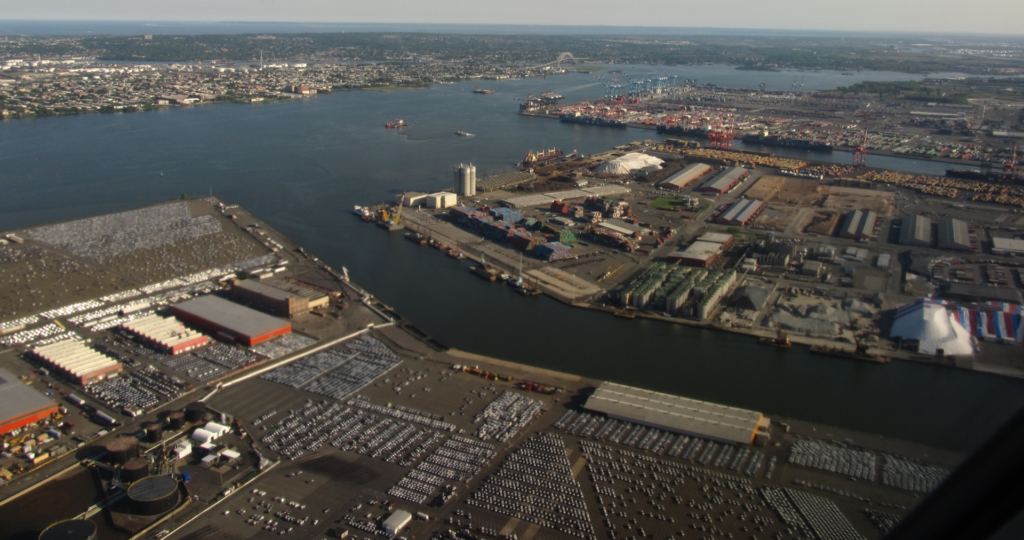Ports in New Jersey and New York are among the 36 from Maine to Texas closed after dock workers went on strike just after midnight on Tuesday, Oct. 1.
Aside from New York and New Jersey, over 25,000 union workers formed picket lines at ports in Baltimore; Boston; Charleston, South Carolina; Jacksonville, Florida; Miami, Florida; Houston, Texas; Mobile, Alabama; New Orleans, Louisiana; Norfolk, Virginia; Philadelphia, Pennsylvania; Savannah, Georgia; Tampa, Florida; and Wilmington, Delaware.
These East Coast and Gulf of Mexico ports handle roughly half of the country’s ship cargo. The Port of New York and New Jersey is among the world’s biggest natural harbors and is the busiest port on the East Coast. It’s also the busiest port by maritime cargo volume and is a major economic engine for the Greater Meadowlands Region and the Metropolitan Tristate area.

The Negotiating Table
The work stoppage, the first at East and Gulf Coast ports since 1977, follows a lengthy impasse in labor talks between the International Longshoremen’s Association (ILA) and the United States Maritime Alliance (USMX), a shipping industry group representing terminal operators and ocean carriers. Wages, job security, and automation are the central issues on the table.
The last USMX offer “fell far short of what ILA rank-and-file members are demanding in wages and protections against automation,” the ILA said in a statement.
“USMX brought on this strike when they decided to hold firm to foreign owned Ocean Carriers earning billion-dollar profits at United States ports, but not compensate the American ILA longshore workers who perform the labor that brings them their wealth,” ILA President Harold Daggett said in a statement.
“We are prepared to fight as long as necessary, to stay out on strike for whatever period of time it takes, to get the wages and protections against automation our ILA members deserve,” Daggett added.
The Economic Impact
Analysts at Sea-Intelligence, a Copenhagen-based shipping advisory firm, estimated that it could take anywhere from four to six days to clear the backlog for each day there is a strike.
Once the strike ends, “this buildup of containers would have to be handled on top of the normal flow,” said Alan Murphy, CEO, Sea-Intelligence.
“A 1-week strike in the beginning of October, would not be cleared until mid-November. If we get a 2-week strike, then realistically, the ports would not be back to normal operations until we are into 2025,” Murphy said.
Industry experts warn that the negative effect on the global supply chain will be widespread and will cost the U.S. economy millions or billions daily. A one-week strike could cost the U.S. economy nearly $3.8 billion and increase the cost of consumer goods, according to the Conference Board, a global, nonprofit think tank. JP Morgan estimated that a strike would cost the U.S. economy as much as $5 billion a day.
A long strike could curtail shipments of manufacturing components, plywood, and raw materials such as cotton and copper. Fresh meat and other refrigerated foods also could spoil, resulting in shortages and increased prices.
The White House
President Joe Biden can suspend the strike for 80 days under the 1947 Taft-Hartley Act, but because this is collective bargaining, Biden said it doesn’t fit.
The White House said in a statement that Biden and Vice President Kamala Harris are “closely monitoring potential supply chain impacts and assessing ways to address potential impacts, if necessary.”
ILA vs USMX
“USMX owns this strike now,” said ILA President Daggett. “They now must meet our demands for this strike to end.”
USMX has filed a grievance with the National Labor Relations Board against the ILA seeking to order them back to the negotiating table. The Unfair Labor Practice charges that the ILA is refusing to bargain on a new Master Contract.
Teamsters Support for the ILA
The Teamsters, the biggest union in the U.S., threw its support behind the ILA’s fight for higher wages and job security protection in light of automation.
“The International Brotherhood of Teamsters, including our members in the freight industry, stand in full solidarity with the International Longshoremen’s Association as they fight for a fair and just contract with the ocean carriers represented by USMX,” said Teamsters General President Sean M. O’Brien.
“The ocean carriers are on strike against themselves after failing to negotiate a contract that recognizes the value of these workers. Our ILA brothers and sisters play a critical role in keeping the American economy running, and they deserve industry-leading wages and robust job protections for the vital work they perform,” O’Brien added.
The Teamsters maintain that the government should stay out of the negotiations and “allow union workers to withhold their labor for the wages and benefits they have earned.”













